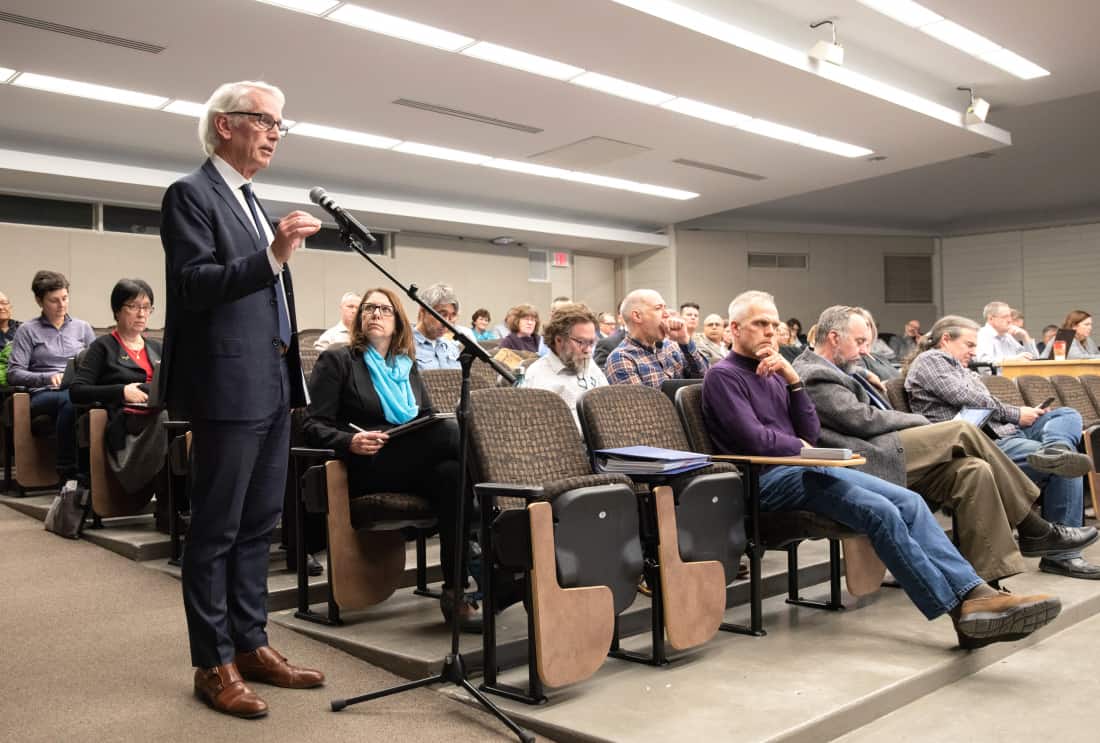
On Jan. 17, the University Council discussed issues on transparency, greenhouse-gas emissions, university rankings and reading week. Before the meeting, physics department head Tom Steele paid tribute to Harvey Skarsgard, a former physics faculty member who passed away on Oct. 21, 2018.
Beginning by continuing a discussion from a meeting held on Dec. 20, 2018, retired English professor Len Findlay spoke to the council about his concern of redacting transcripts for freedom in information requests. The university has acted in non-compliance with the privacy commissioner’s informal ruling. The information in question is an audio recording of a by-invitation-only symposium held at the University of Saskatchewan in 2015.
Findlay asked for more information to be released. He says that the recording of the symposium might be relevant to an upcoming investigation into the alleged interference of agricultural giant Monsanto in university affairs.
“Members of council may appear [to be] willing parties to a policy that masks the culture of secrecy within appeals to confidentiality,” Findlay said. “Another incentive for council to inform themselves about this matter comes in the form of an impending public disclosure by the CBC Radio Canada investigative team on the influence wielded by Monsanto on Canadian university campuses — and guess who’ll be starring in that piece.”
Findlay left after speaking. University President Peter Stoicheff speaks to Findlay’s concerns, reiterating the importance of freedom of discussion as a principle.
“We do need to separate out the rather emotional aspects and important aspects of the Monsanto piece in all of this,” Stoicheff said. “I would encourage all of us to … move towards a position based on principles, not based on the circumstantial specifics of that particular meeting, so as to safeguard all of us in the future when we have all kinds of discussions, formal and informal.”
The floor was opened for questions to the president. Large Animal Sciences representative Claire Card had a question regarding the University’s goals for reducing greenhouse-gas emissions as outlined in their 2012 Climate Action Plan.
“I am reading in the Sheaf that the climate portfolio at the University of Saskatchewan may be lagging behind,” Card said. “The last available information they reported was from 2016, [which] showed we had only decreased less than 2 per cent. We had really no further movements, as far as I can see, campus-wide for getting serious about those targets.”
Stoicheff agreed with Card and says that efforts towards sustainability will be increased.
“I created a President’s Sustainability Council that did a lot of good work starting about a year and a half ago. We haven’t announced yet that it is redoubling its efforts,” Stoicheff said. “One of the things I have asked the President’s Sustainability Council to do is to advise me on building into the university’s administration a successful, influential sustainability position.”
After questions for the president were over, U of S Students’ Union President Rollin Baldhead presented a report to the council and then received questions. Medicine representative Marcel D’Eon asked Baldhead about the possibility of opening up the fall reading week break to the programs that currently do not have it, which are, in his opinion, among the programs that need it the most.
Baldhead says that the USSU has plans to address the issue.
“We do have members of student council that are from these colleges that need those breaks,” Baldhead said. “That is one of our initiatives, as well as engaging with the student body to really figure out how to better act to this issue.”
Among the topics left for future meetings is D’Eon’s question about the university’s policies in their “dealings with oppressive regimes,” in light of a Canadian being detained and sentenced to death in China. D’Eon asked for President Stoicheff to address that concern in a future report.
—
Ana Cristina Camacho / Staff Writer
Photo: David Hartman
Leave a Reply